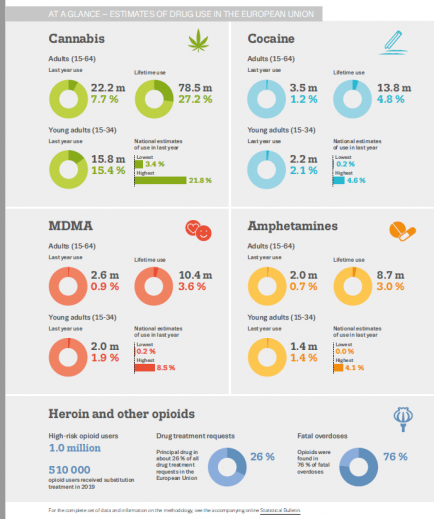The European Drug Report 2021: Trends and Developments is out! Based on data from 29 countries (EU 27, Turkey and Norway), the report offers new insights into the health and security implications of a complex and evolving drugs problem and of a drug market resilient to COVID-19 disruption.
This publication of the European Monitoring Centre for Drugs and Drug Addiction (EMCDDA) can be found here, but we would like to highlight some key issues related to the scope of BorderSens project:
COVID-19 has been a catalyst for a resilient and more digitally-enabled drug market, as drug traffickers adapt to travel restrictions and border closures.
- In the early lockdown periods, there was less consumer interest in substances usually associated with recreational events (e.g., MDMA) as people stayed at home. However, analysis of wastewater samples (available for some European cities) suggests that levels of use of most drugs bounced back as restrictions on movement, travel and social gatherings were eased in summer 2020.
- A rise in use of benzodiazepines is seen among high-risk drug users, prisoners and some groups of recreational drug users, potentially reflecting the high availability and low cost of these substances and pandemic-related mental health issues.
- Cannabis use remains stable at high levels, but increased THC content raises health concerns.
- Record cocaine seizures, a worrying signal of potential for increased health harms.
- Stable amphetamine demand makes domestic production near consumers profitable — Alongside the dismantling of production facilities in 2019, chemicals used to manufacture amphetamine were also seized in the EU, including 14 500 litres of BMK and 31 tonnes of MAPA (up from 7 tonnes in 2018).
- Methamphetamine production and trafficking highlight potential for increased use in Europe.
- Risks to health from supply of high-strength MDMA products.
- Harmful potent new psychoactive substances continue to emerge, including new synthetic cannabinoids and new synthetic opioids.
- Large volumes of heroin are still being seized in the EU (7.9 tonnes in 2019), raising concerns around the possible impact on levels of use.
- Organised crime groups intensify illegal drug production within Europe.


